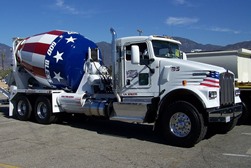How to Select the Right Trucking Classes near Ontario California
 Congrats on your decision to become a trucker and enroll in a CDL school near Ontario CA. Maybe it has always been your ambition to hit the open road while driving a big ole tractor trailer. Or possibly you have conducted some analysis and have discovered that an occupation as a truck driver provides excellent income and flexible job prospects. Whatever your reason is, it's imperative to receive the proper training by selecting the right CDL school in your area. When reviewing your options, there are various factors that you'll want to think about prior to making your ultimate choice. Location will undoubtedly be important, particularly if you have to commute from your Ontario residence. The cost will also be important, but choosing a school based entirely on price is not the ideal way to guarantee you'll get the proper education. Don't forget, your goal is to learn the skills and knowledge that will enable you to pass the CDL exams and become a professional truck driver. So keeping that goal in mind, just how do you pick a truck driving school? The answer to that question is what we are going to address in the rest of this article. But first, we are going to review a little bit about which CDL license you will ultimately need.
Congrats on your decision to become a trucker and enroll in a CDL school near Ontario CA. Maybe it has always been your ambition to hit the open road while driving a big ole tractor trailer. Or possibly you have conducted some analysis and have discovered that an occupation as a truck driver provides excellent income and flexible job prospects. Whatever your reason is, it's imperative to receive the proper training by selecting the right CDL school in your area. When reviewing your options, there are various factors that you'll want to think about prior to making your ultimate choice. Location will undoubtedly be important, particularly if you have to commute from your Ontario residence. The cost will also be important, but choosing a school based entirely on price is not the ideal way to guarantee you'll get the proper education. Don't forget, your goal is to learn the skills and knowledge that will enable you to pass the CDL exams and become a professional truck driver. So keeping that goal in mind, just how do you pick a truck driving school? The answer to that question is what we are going to address in the rest of this article. But first, we are going to review a little bit about which CDL license you will ultimately need.
Which CDL Will You Need?

In order to operate commercial vehicles legally within the United States and Ontario CA, a driver needs to get a CDL (Commercial Driver's License). The three license classes that a driver can qualify for are Class A, Class B and Class C. Since the subject of this article is how to choose a truck driver school, we will address Class A and Class B licenses. What differentiates each class of CDL is the type of vehicle that the driver can operate together with the GVWR (Gross Vehicle Weight Rating) or GCWR (Gross Combination Weight Rating). Following are brief descriptions for the 2 classes.
Class A CDL. A Class A Commercial Drivers License is needed to drive any vehicle that has a GCWR of greater than 26,000 lbs., including a towed vehicle of greater than 10,000 lbs. Some of the vehicles that drivers may be able to operate with Class A licenses are:
- Interstate or Intrastate Tractor Trailers
- Trucks with Double or Triple Trailers
- Tanker Trucks
- Livestock Carriers
- Class B and Class C Vehicles
Class B CDL. A Class B CDL is required to operate single vehicles having a GVWR of more than 26,000 lbs., or a GCWR of greater than 26,000 lbs. including a towed vehicle weighing up to 10,000 lbs. Several of the vehicles that operators may be qualified to drive with Class B licenses are:
- Tractor Trailers
- Dump Trucks
- Cement Mixers
- Large Buses
- Class C Vehicles
Both Class A and Class B CDLs might also require endorsements to operate certain kinds of vehicles, for example passenger or school buses. And a Class A licensee, with the proper needed endorsements, may operate any vehicle that a Class B licensee is authorized to operate.
How to Evaluate a Truck Driver School

As soon as you have decided which CDL you would like to obtain, you can start the undertaking of evaluating the Ontario CA truck driving schools that you are looking at. As already mentioned, location and cost will no doubt be your initial concerns. But it can't be emphasized enough that they must not be your sole considerations. Other variables, such as the experience of the instructors or the reputations of the schools are equally or even more important. So following are several additional points that you should research while carrying out your due diligence prior to selecting, and particularly paying for, your truck driver training.
Are the Schools Certified or Accredited ? Not many truck driving schools in the Ontario CA area are accredited because of the rigorous process and cost to the schools. However, certification is more typical and is provided by the Professional Truck Driver Institute (PTDI). A school is not required to become certified, but there are a number of advantages. Interested students recognize that the training will be of the highest caliber, and that they will be given lots of driving time. For example, PTDI mandates 44 hours of real driving time, not simulations or ride-alongs. So if a school's program is certified (the program, not the school is certified), students know that the curriculum and training will fulfill the very high standards set by PTDI.
How Long in Operation? One clue to help measure the quality of a truck driver school is how long it has been in operation. A negatively ranked or a fly by night school normally will not be in business very long, so longevity is a plus. Having said that, even the best of Ontario CA schools had to start from their first day of training, so use it as one of multiple qualifications. You can also learn what the school's history is relating to successful licensing and employment of its graduating students. If a school won't supply those numbers, look elsewhere. The schools should additionally have relationships with regional and national trucking companies. Having a large number of contacts not only affirms a quality reputation within the profession, but also boosts their job assistance program for students. It also wouldn't hurt to check with the California licensing authority to confirm that the CDL trucking schools you are considering are in good standing.
How Effective is the Training? As a minimum requirement, the schools must be licensed in California and employ teachers that are trained and experienced. We will discuss more about the teachers in the next section. Also, the student to instructor ratio should be no higher than 4 to 1. If it's any higher, then students will not be obtaining the individual attention they will need. This is especially true regarding the one-on-one instruction for behind the wheel training. And watch out for any school that claims it can teach you to be a truck driver in a relatively short time period. Learning to be an operator and to drive a tractor trailer professionally takes time. The majority of Ontario CA schools provide training courses that range from 3 weeks to as long as 2 months, based on the license class or type of vehicle.
How Experienced are the Teachers? As previously mentioned, it's essential that the teachers are trained to teach driving methods and experienced as both instructors and drivers. Even though several states have minimum driving time criteria to qualify as an instructor, the more professional driving experience a teacher has the better. It's also vital that the instructors stay current with industry advancements or any new laws or changes in regulations. Evaluating instructors may be a bit more subjective than other standards, and perhaps the ideal approach is to visit the school and talk to the instructors face to face. You can also speak with a few of the students completing the training and ask if they are satisfied with the quality of instruction and the teacher's qualification to train them.
Adequate Driving Time? Above all else, a good trucking school will furnish ample driving time to its students. Besides, isn't that what it's all about? Driving time is the real time spent behind the wheel operating a truck. Even though the use of ride-a-longs with other students and simulators are important training methods, they are no substitute for actual driving. The more instruction that a student receives behind the wheel, the better driver he or she will become. And even though driving time differs between schools, a reasonable benchmark is a minimum of 32 hours. If the school is PTDI certified, it will provide no less than 44 hours of driving time. Get in touch with the Ontario CA schools you are researching and find out how much driving time they furnish.
Are they Captive or Independent ? It's possible to get free or discounted training from some truck driving schools if you enter into an agreement to drive for a specified carrier for a defined time period. This is what's known as contract training, and the schools that offer it are called captives. So rather than having relationships with many different trucking lines that they can place their graduates with, captives only work with one company. The tradeoff is receiving less expensive or even free training by surrendering the flexibility to initially work wherever you choose. Clearly contract training has the potential to reduce your income prospects when starting out. But for many it may be the only way to receive affordable training. Just remember to find out if the Ontario CA schools you are considering are captive or independent so that you can make an informed decision.
Offer CDL Testing Onsite? There are several states that will allow third party CDL testing onsite of trucking schools for its grads. If onsite testing is allowed in California, find out if the schools you are looking at are DMV certified to offer it. One benefit is that it is more convenient than battling with graduates of other schools for test times at California testing facilities. It is also an indication that the DMV regards the authorized schools to be of a superior quality.
Are the Classes Flexible? As previously mentioned, CDL training is just 1 to 2 months in length. With such a short term, it's important that the Ontario CA school you select offers flexibility for both the scheduling of classes and the curriculum. For example, if you're having a hard time learning a certain driving maneuver, then the teacher should be willing to commit more time with you until you have it mastered. And if you're still working while going to training, then the class scheduling needs to be flexible enough to fit in working hours or other obligations.
Is Job Placement Offered? Once you have attained your CDL license after graduating from trucking school, you will be anxious to start your new career. Verify that the schools you are contemplating have job placement programs. Find out what their job placement rate is and what average salary their graduates start at. Also, ask which national and local trucking firms their graduates are placed with for employment. If a school has a low job placement rate or few Ontario CA employers hiring their grads, it might be a sign to look elsewhere.
Is Financial Aid Given? Truck driver schools are much like colleges and other Ontario CA area trade or technical schools when it comes to loans and other forms of financial assistance being available. Find out if the schools you are assessing have a financial aid department, or at a minimum someone who can help you understand the options and forms that must be submitted.
Find Out More About Ontario Trucker Schools
Enroll in the Right Ontario CA Truck Driver Training
Choosing the ideal trucking school is an important first step to beginning your new vocation as a long distance or local truck driver. The skills that you will learn at school will be those that mold a new career behind the wheel. There are many options offered and understanding them is critical to a new driver's success. However, you must get the appropriate training in order to drive a big commercial vehicle in a safe and professional manner. If you are lacking funds or financing, you may need to consider a captive school. You will pay a reduced or even no tuition in exchange for driving for their contracted carrier. Or you can select an independent trucker school and have the the freedom to drive for the trucking company of your choosing, or one of several associated with the school. It's your choice. But regardless of how you obtain your training, you will in the near future be entering an industry that helps our country move as a professional truck driver in Ontario CA.
